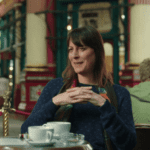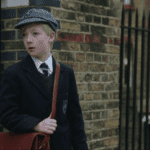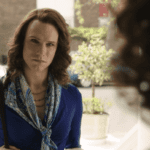Our coverage of the 8-part Amazon Prime series The Romanoffs from Mad Men creator Matthew Weiner concludes with Caemeron Crain and Lindsay Stamhuis’s final roundtable for the eighth episode, “The One That Holds Everything”
Authors’ Note: This episode features a significant storyline centered on a transgender character both before and after her transition. We have endeavoured to be careful with regard to correct pronoun usage throughout.
CC: So, here we are at the end of the season, Lindsay. I thought this episode had an interesting structure—kind of like a matryoshka, with stories nested inside of other stories—and the title made me wonder about to what extent it might tie everything together. Maybe not so much on that front, unless we get at something thematically, but did you notice Greg (Aaron Eckhart) and Sophie (Louise Bourgoin) towards the beginning? What do you think of this as a capstone to the season, if not the series?
LS: YES! That’s the perfect analogy for this—a matryoshka doll! I thought that, in itself, was a beautiful little thematic link for this finale. I’m sure we’ll talk about it more as we move through this convo tonight, and as a storyteller myself, I thought it was a bold, ambitious move to structure this episode in this way. If nothing else, that’s what stood out for me the most.
I thought I noticed Sophie, yes! Was Aaron Eckhart there as well? It makes me wonder if other characters and links and clues to the relationships between them are all part of the previous episodes. Like, Jack (JJ Feild) was the writer on the Romanov miniseries from way back in Episode 3, wasn’t he?
CC: Yes, we seem to have gotten that connection. I had a keen eye out for others after noticing Greg and Sophie early on (yes, they were both there in the train station), though, but I didn’t notice others in this episode. I could have missed something, though, to be sure.
Agreed about the structure. I wasn’t sure about it at points, but at the end of the day it’s what stands out the most for me and I thought it was really interesting.
LS: Well and I think the title suggests that it’s meant to be important. “The One That Holds Everything”. So does that mean it’s a lynchpin for the whole series? Does it contain all the answers? Or it is simply a distillation of the essence of the entire series in one nearly-feature-length episode? I don’t know. But I definitely enjoyed it. I think, like you, I was pulled out of it at first by the campiness of it. When they zoom in past Candace’s (Adèle Anderson’s) face to focus on the scene outside the train window as she tells the story, it felt…theatrical, in a way. But the next few layers of story-within-a-story hooked me right in. It’s Matt Weiner telling a story about a woman telling a story about a man telling a story about his lover telling a story about a troubled boy…
CC: It was odd for me; I was really enjoying the conversation between Candace and Jack on the train in a weird way. He was trying to read his book and she just kept talking to him. I had a similar experience to that the other day on the subway. Then we shift from one story to another. I think it all worked, but I’m glad it circled back around the way it did.
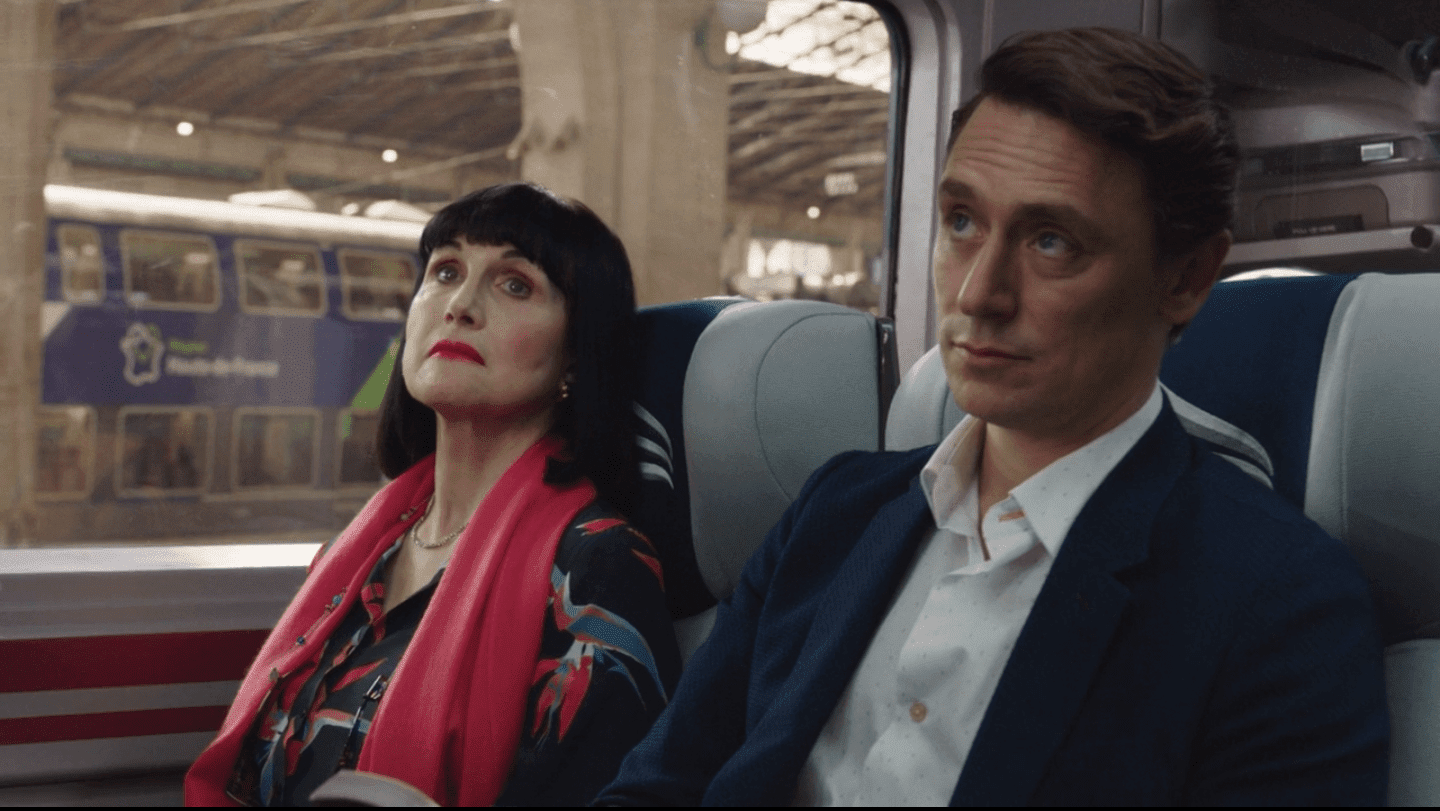
LS: The idea of descending into a story and going further and further back into memory and time as we go, and then gradually coming back up to the present day was a nifty little trick. Reminded me of Inception. But it also felt fresh. I think the story kind of threw me too. On the surface it’s the story of Simon (Hugh Skinner) and his father’s second wife/his own former nanny Ondine (Hera Hilmar) and whether or not she killed his mother (for the record, I’m almost positive she did). His revenge on her is a long time coming. But then we have this interesting growth in Simon, from an effeminate schoolboy to a closeted gay man to a transgender woman, playing out from the early 1960s through the 1980s and into the present day, with all the prevailing attitudes about LGBTQ+ community present at every step along the way. Generally speaking, what were your thoughts on all of that? Did anything jump out at you in the story?
CC: Well, to start with, yes, I did conclude that Ondine burned that house down. It’s not definitive, but I think it gets close.
Simon’s story was both intriguing and a bit heartbreaking to me. It’s true that, as you say, he was in the closet during that backstory with Christopher (Christopher Goh), but it also seemed like he didn’t want to be. That is, there are indications that he perhaps wanted to be open about it even given the times.
But Christopher is going to marry a woman, and we actually get Simon’s backstory through him telling her about it to undermine Simon’s (true) account of him getting a blowjob and so on…
LS: I was going to ask you about the narration as well, because the fact that part of this story (a rather significant part, actually) is told through Christopher’s eyes might mean that it’s not 100% accurate. And we have Christopher’s fiancee Kiera (Jing Lusi) reminding us that Simon is a liar himself, so how much of any of this can be believed. I think it might be an inescapable, inconvenient truth that the stories we’re being told here could be less than true. We’ve talked about this a bit before, I think—unreliable narrators and so on. Do you think that’s at play here?
As regards Simon’s transition, I’m struggling to find the right words to articulate what I’m thinking. In fact, I feel terrifically unqualified to speak to Simon’s/Candace’s story at all because I am a cishet woman living in a place of tremendous privilege in comparison to what transgender men and women live with every day. Still, from my perspective, the scene at the cafe after the group therapy session—where Simon speaks with Dana (Rebecca Root) and is effectively given permission to live as a woman—resonated deeply. It feels like something he wouldn’t have received from anyone else in his life up until that point. For me, that felt like an important scene. I was also greatly heartened by the fact that Rebecca Root is herself a trans actress. (So is Adèle Anderson.)
But part of me also feels very awkward about Simon’s journey being, at times, alternately foregrounded and backgrounded by this rather sensational murder mystery plot. On the one hand, it normalizes Simon’s experience by placing it in the context of the myriad other things he has going on in his life. His sexuality is just one part of who he is and what is going on for him. On the other hand, at times it was almost sensationalized for the shock value. I’m thinking specifically of the reveal that Candace and Simon are the same person; Simon’s arrival at Ondine’s home is another moment that made me feel acutely uncomfortable. I want to applaud The Romanoffs for employing a diverse cast and sensitively and appropriately casting transgender women in prominent roles here, but I also don’t want anyone to rest on their laurels thinking “We’ve solved this problem!” when they might have still missed the mark. But, again, I say this as a cishet woman. Does that make sense?
CC: Yeah, there was a point where I wrote in my notes something like “is Simon trans?” and then mere minutes later changed that to “Simon is trans”—it was well established earlier on that he was gay, but that’s not the same thing. Her gender identity and her sexuality are different things.
I think the show did a pretty good job with that. I don’t know. But, yeah, her transformation (through plastic surgery I guess?) and the murder thing I wasn’t too sure about (though I thought it worked well enough, narratively).
LS: Narratively it was great and I enjoyed it. I actually laughed out loud at how well I’d been hooked into that frame narrative—that train ride from Paris to London—which book-ended the central plot. It was only after that I began to wonder if Simon’s and Candace’s gender and sexuality were being used to advance that plot instead of growing organically from the plot. The latter is certainly more palatable and desirable in a work of fiction than the former. I’m still not sure which is the case here.
Still, I found it to be a challenging episode and because of that challenge I enjoyed it a lot. It certainly wasn’t as lazy as previous episodes have been. I think the series ended very strongly on the final two episodes. What are your thoughts there?
CC: Yes, I agree with all of that. Going back to the question you raised about the structure and whether we are getting an unreliable narrator, I have been thinking about the fact that a good amount of Simon’s story is framed through the lens of Christopher talking to Kiera, as we hit on before, but if you think about how this fits in overall it is really pretty odd. That is, if we think of the whole story as the one being told by Candace to Jack on the train, it doesn’t make any sense to have this story within the story coming from Christopher, does it? Should we imagine Candace telling Jack about Christopher telling Kiera these things? But how would she know about that conversation to that level of detail? So, then, perhaps we are actually seeing the conversation between Christopher and Kiera, which raises a further question about the reliability of what we see of the young Simon if it is from Christopher’s perspective. I’m not trying to argue that the episode is inconsistent or anything. On the contrary, I think all of this makes it more interesting. It’s not just stories within stories, but potentially unreliable narrators nested within unreliable narrators. The more I think about that, the more it strikes me as a novel thing that they did here.
LS: That’s my feeling too. What I find personally interesting is this idea of unreliable memory being a basis for stories, so to see it happening on such different yet interconnected levels is fascinating. I suppose since we’re talking about it we should ask the question: if there are things being told here that Candace couldn’t possibly know, how does that play into her motive for killing Jack? Is she filling in gaps in order to justify her desire for revenge? Maybe it’s because I’ve just finished teaching a unit on Edgar Allen Poe—“The Cask of Amontillado” and Montresor’s motive for killing Fortunato, right?—but I thought I’d bring it up. But maybe it doesn’t matter. What do you think?
CC: How does the stuff with Christopher feed into her motives in relation to Jack in general? I’m not sure if it does, but then we have Christopher using Simon’s backstory to try to explain to Kiera why he would “lie” about the blowjob, and that seems to work for her. So that gets me thinking about it in relation to Simon/Candace being undermined or disrespected in a general way (I can see why you are thinking about Poe here). Simon’s identity was consistently undermined throughout his life—as though he was told he couldn’t be himself. When he suggests to Christopher that they should be able to be together, the latter laughs at the suggestion; given the social circumstances at the time, and so on, he takes such a thing to be impossible (and it is a little unclear how possible it would even feel in China now).
Simon’s father marries the woman who (we think) killed his mother, and starts a new family that does not include him. And the center of that new family is Jack. Perhaps this gets at an aspect of the motive to kill Jack; it’s not just to hurt Ondine, but maybe because Jack feels representative of all of these slights. Does that make sense? How are you thinking about it?
LS: Well I’m thinking that, if we are to understand that this is Candace telling Jack all about what Christopher said to Kiera (a conversation she could never have overheard) then isn’t it possible that that entire story is relayed to Jack in order to further justify (to herself? to us?) her motive for revenge? Do we know for sure that Christopher was even real? I guess it starts to get dicey at that point so perhaps it’s not a valuable route to dive down, but it was something that got me thinking, all the same.
CC: I think it would be pretty weird if Christopher weren’t real, especially since that part of the story relates to Candace’s motives somewhat tenuously. It more fleshes out the history of this person. I’m also unsure as to what she is and is not telling Jack to be honest. If she were using the names of the family members, Jack surely would’ve figured out it was his family being discussed far earlier. So I am almost tempted to suggest that what we see is objective reality as opposed to being colored by the perspectives of the storytellers, as much as that feels like the opposite of what I just said a minute ago. Maybe it isn’t, but the unreliability of the narrators relates more to us not getting their perspectives, really, or something like that. I don’t know. Am I even making sense?
LS: It’s a very confusing thing but I love that it’s making us question our assumptions about storytellers and storytelling. I can’t help but feel as though that’s the point. We have an introduction to Jack right at the start of the episode and he tells us that he is a writer working on a miniseries about the Romanovs. Immediately I thought this was some kind of self-insert Gary Stu character intended to represent Weiner himself. But Jack ends up not being the protagonist; the writer gets taken down by a storyteller who spins a delightful little yarn about murder…which, I mean, technically could be his own murder right? It’s almost terribly clever.
CC: I couldn’t agree more, and I think it relates to the way the show has been playing with ambiguity or blurring the line between fact and fiction throughout. Are these people who claim to be Romanovs actually descendants? Someone told me that in the untranslated Russian dialogue last week, the woman who runs the orphanage doesn’t say that it’s great that Anka is a Romanov, but rather scoffs at her claim. This sort of thing has struck me as a running theme to the show, in line with the question as to whether Anna Anderson was Anastasia Romanov, but at a more thematic level. Since we’re at the end of the line, now, do you have any thoughts along these lines of asking what the show is about? And if we do take Jack as representing Weiner, how might we read that? The suicide of the author?
LS: It would be a unique post-postmodern Barthesian take on the death of the author, eh? The author is still dead but it’s by his own hand. An interesting thing to consider on its own, I think.
I did want to ask you almost the same question, about what the show was about. Because it seemed at various points to be “about” a lot of different things—wealth disparity, haves and have-nots, gender relations, family dynamics, etc.—but it never quite pointed to anything as…er…pointedly as it did with this episode, which felt far more self-referential and aware of its place in the narrative. So I come back to the title: “The One That Holds Everything”. If there was going to be a thesis for this exercise, I would assume it’s in this final installment. What is it? I wonder. But it does seem as though it’s asking us to consider truth and memory and how both relate to identity a lot more strongly than any previous episode has, while at the same time colouring in the previous episodes with a little more vibrancy than we had on first glance. Because doesn’t every episode contain aspects of this? Stories being told and memories being examined and identities being hashed and rehashed and questioned?
CC: Perhaps something about identity is what holds all of those things together? How we conceive of ourselves and how others conceive of us intersect, and the line is blurry; the question of self-identity itself ambiguous. In “House of Special Purpose” reality itself is at stake, in “End of the Line” it is perhaps the question of what it means to be a good person…maybe it would be possible to articulate something like that for each episode. I know, for example, that we were both a little confused as to what the message of “Panorama” was meant to be, but I was ultimately taken by the view of someone on Reddit who suggested that it was about calling into question the male privilege of the protagonist, and that the final scene where the Rivera painting comes to life is more about his fantasy with regard to his place in the world than the reality of things. I think I’d at least like to read it that way, if I can give the show that much credit, or be that charitable. And this last episode makes me think maybe I can be. I’m even tempted to revisit “Expectation“—which felt like the low point of the series to me—with some of these thoughts in mind.
I keep mentally wanting to add ‘together’ to the end of this title, but it’s not there. Yet, thematically maybe it is? Issues about wealth disparity, gender, family, privilege, etc. held to together in this story that culminates in murder. And, then, whose side are we on?
LS: That’s an interesting question: whose side are we on? There are a lot of sides here, a lot of grey area. It’s a messy show, with high points and low points and good bad guys and bad good guys. It’s full of artifice and yet it feels strangely alive in a way few other shows I’ve watched recently have felt.
This talk about identity and, now, artifice also reminds me of that quote, which I’m now going to badly paraphrase because I can’t locate the original: people who know you don’t know you as the same person you think you are. You’re always two different people. (Or something like that). I think that kind of gets to the heart of what we’ve seen—that these people believe themselves to be one thing (aristocratic, deserving, important, etc) and are actually viewed by others as something different than that in virtually every case. But neither is any less true, is it? Or maybe it is. I don’t know.
CC: I don’t know what you may be thinking of precisely, but I know how Jean-Paul Sartre put that point: “Hell is other people“—he didn’t mean (just) that other people are annoying, but that their perspective on me plays a role in defining me that is at odds with how I think of myself and calls into question my freedom to determine myself. So, I would go further than what you say: I am not just two different people, but as many different people as the relationships with others that I am in. Or, rather, my identity would be the sum total of all of these perspectives, something that I myself can never adequately grasp, and that’s terrifying. It’s much more comfortable if I can convince myself that I am in full control, but I think we are agreeing that this show is constantly undermining that, yes? You’ve got me thinking that this might be the central question of the series; something about self-identity and how that relates to privilege in various ways…
LS: Precisely. It is terrifying. How can you even have an identity at all if who we actually are is so totally inaccessible to us? Which might play into what you’re saying about privilege—in the “woke” sense of the word, yes?—because privilege seems to always be defined by someone else, which means it’s not something you necessarily inherently have access to (at least not in strict Cartesian terms). If you don’t know the privilege you possess, you can’t address it. But you need to accept a third party view of you in order to start that process in the first place. That requires a solid sense of self, which, if we circle back to the start again, is nearly impossible to have because you don’t have access to your own identity to begin with it. These Romanoffs (clever, that—because are they actually Romanovs or are they slightly “off”? I think you brought that up way back at the start of this series, yeah?) are doubly screwed if who they think they are rests on such shaky ground as Anna Anderson’s did. Right? So it becomes a really fascinating question: Who do you actually think you are? What gives anyone the right to presume anything about anyone, or even themselves? (This could get into icky ground if it’s somehow used an argument against the idea of questioning one’s privileges or beliefs about themselves, which I’m not quite suggesting is the case here, but I just thought I’d throw it in there anyway: this isn’t something that’s wholly pure.)
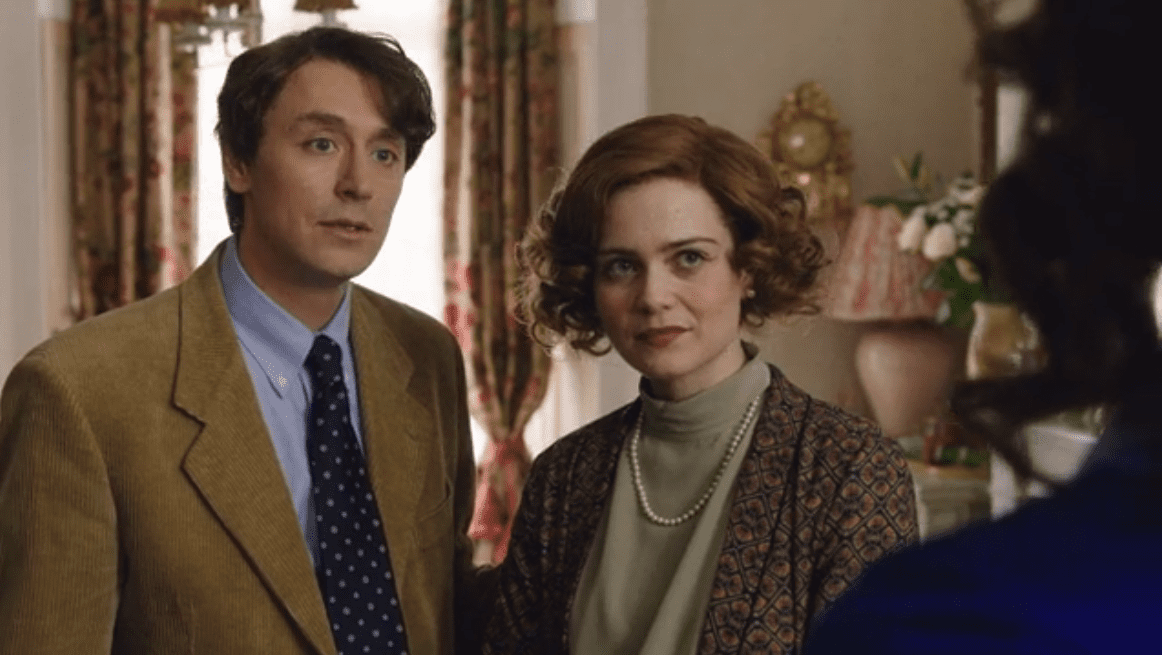
CC: Yes, privilege as something systemic is what I was thinking about. And you’re right, there is a difficulty about one’s own access there. A poor white person might buck against the language of “white privilege” but that involves a failure to properly understand the claim. I think you’re right to suggest that doing so involves moving outside of oneself, or taking something like a third person point of view, and that’s not easy. But it’s necessary. I think this is something the show gets at as well. It’s not that you don’t have access to your personal identity, it is that one’s own identity is problematic. It’s always a work in progress, and there are pitfalls to holding too tightly to something like, “I am a Romanoff” that come out in various ways. I’m at risk of imputing something to the text that may not be there, but I want to say we’re moving in the direction of thinking about the problems that come with categorizing oneself in any of these ways: in terms of class, race, gender, lineage…the show ends with a transgender murderess…
I don’t think this calls into question Identity politics—at least, not if we are thinking of that the way we should be—but it calls into question the identity part in interesting ways.
LS: We keep saying “interesting” but really, that’s what this whole exercise really has felt like: an interesting exercise, from start to finish. Three final questions for you: Did you enjoy The Romanoffs? Do you think we’ll see more episodes in the future? And will you rewatch the series in light of what we’ve uncovered in our conversations?
Personally, I did enjoy it…I don’t think it will continue…and I think I almost owe it to myself to rewatch the entire series again.
CC: To my mind, being interesting is more important than being “good” if that makes any sense to people. And I definitely thought this show was interesting, overall. In terms of enjoying it, there were ups and downs, but to answer your further question, I am thinking about watching it again in light of the analyses we’ve done, to see if that leads to further interesting things to think about. I think it might. I kind of love how this show has led me to ask thematic level questions from the get-go, because it is an anthology series where the connecting theme is less than clear. And thinking about it to discuss it with you, or to write about it on my own a couple of times, has made me appreciate it more. That’s always a good sign, in my book, if the more I think about something the more I appreciate it.
As to whether it will continue, I am really unsure. On one level, I’m with you in predicting that it probably won’t, based on what it feels like the reception of it has been. On the other hand, I feel like we’re in a brave new world with these streaming services competing with one another, and have little idea as to how Amazon will approach the decision. If it is a matter of thinking of this as a prestige show that might draw subscribers, perhaps they will continue it. If it were left to the vagaries of traditional TV logic, I’m sure it would be done, but given where we’re at, I really don’t know. Do you hope it continues? I just realized I have mixed feelings about that. On the one hand, I do, but on the other this last episode would cap the series really well, as we’ve been discussing. Yet I know from what I have read that Weiner definitely wants to make more…
LS: I’m almost wondering if there’s an opportunity to do a similar anthology like this about another infamous mystery like this. Imagine an Amazon series about Amelia Earhart or DB Cooper or something? Not quite the same thing, I suppose. But who knows?
In any case, I think we’re absolutely seeing how these competing streaming services can drive content to new places. While The Romanoffs wasn’t as qualitatively uniform as I expected it might be, I still enjoyed it and I’m excited to see how other filmmakers and show runners respond and continue to push the envelope like this.
CC: Indeed. And I am intrigued to see what Weiner does next, whether it is more of this or something else.
And, well, I guess that’s a wrap on our coverage of The Romanoffs, eh, Lindsay? I hope that people have enjoyed reading as much as I have enjoyed talking with you about the show.
LS: I have enjoyed our discussions tremendously—for that reason alone I hope there are more episodes! Until then…До встречи!
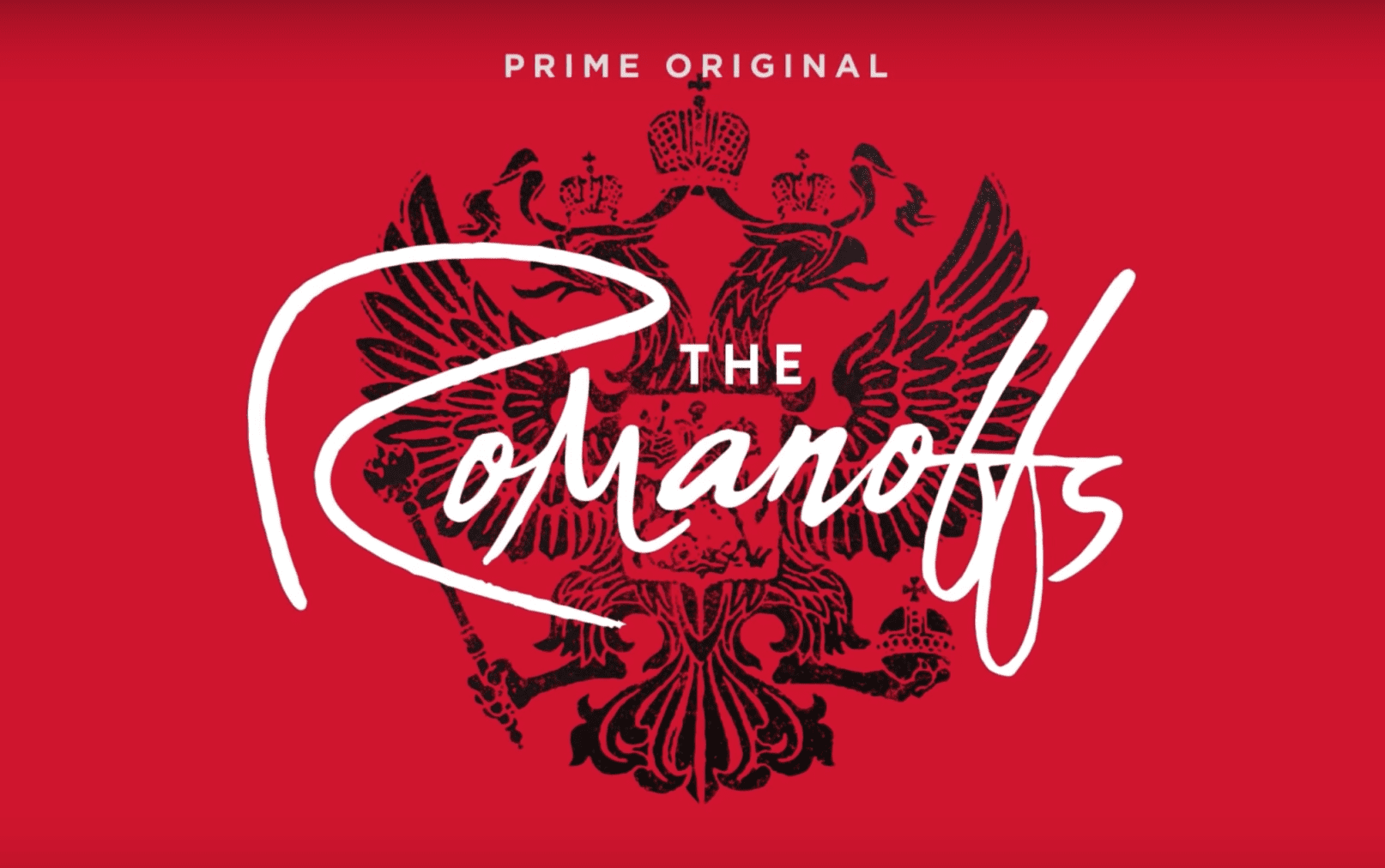
Want to talk more about The Romanoffs? Join this sub on Reddit, and/or hit us up on Twitter: @linzstam & @caemeronCC. Thank you for joining us on this ride!



